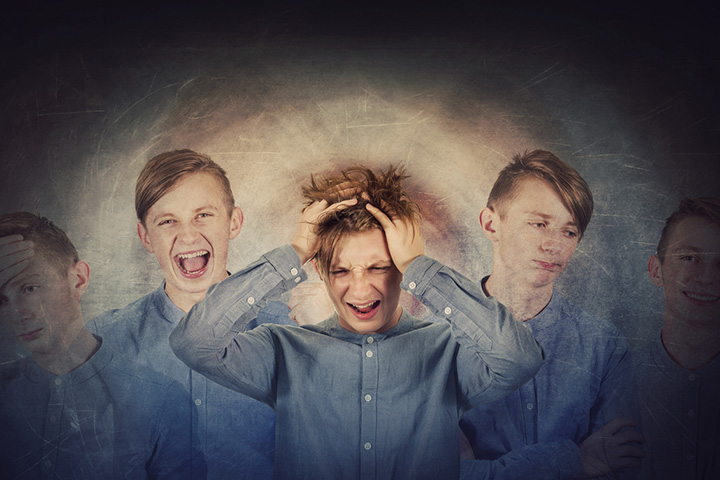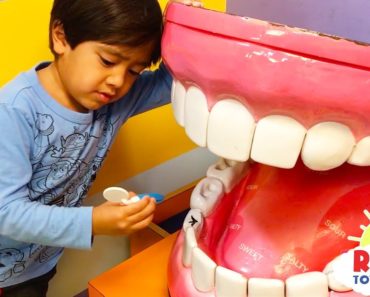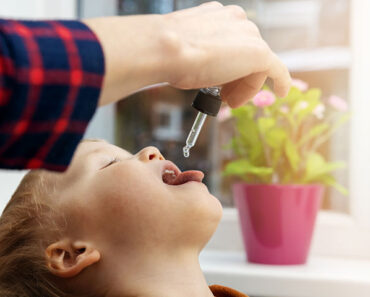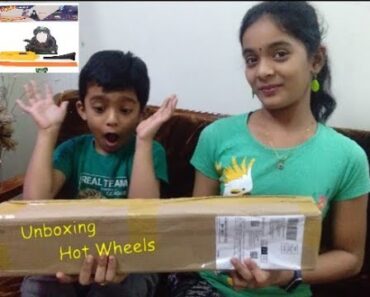Bipolar disorder, also known as manic depressive illness, is characterized by noticeable bouts of mania and major depression. The American Academy of Child and Adolescent Psychiatry describes it as “an illness of the brain that causes extreme changes in a person’s mood, energy level, thinking, and behavior (1).”
The manic phase of bipolar disorder is when the child feels happy, euphoric, and highly active, while the depressive phase is when they feel extremely sad, low, and withdrawn (2).
Bipolar disorder affects about three percent of all children and is diagnosed in children as young as five years. When young children experience the symptoms, it is termed early-onset bipolar disorder (3).
Read this post to know about the types, causes, symptoms, diagnosis, and treatment for bipolar disorder in children.
Types Of Bipolar Disorder In Children
Bipolar disorder in children is classified into three different types (1)(3).
1. Bipolar I
- It is also referred to as manic-depressive illness or classic bipolar disorder.
- It is the most severe form of the disease.
- Children with bipolar 1 type may have manic or mixed episodes that may last for about a week.
- It severely affects the child’s sleep and ability to function well.
- It may happen just before or after a depressive episode that may have lasted for two weeks or longer or have been severe enough to have warranted hospitalization.
2. Bipolar II
- It is a similar but milder form of bipolar type I.
- The episodes may last only for about four days.
- These milder manic symptoms are also known as hypomania.
- It warrants intensive medical care.
3. Bipolar not otherwise specified (NOS)
- It is an even milder form than the other two types.
- The symptoms are also less severe, and the mood swing episodes do not last long.
- The diagnostic criteria for bipolar NOS in children are not clear, making the diagnosis difficult.
Causes Of Bipolar Disorder In Children
The exact cause of bipolar disorder in children is not known. However, researchers believe that the following factors may increase a child’s risk for developing bipolar disorder (2) (3).
1. Genetic factors
- Studies suggest that genetic factors increase the risk of developing bipolar disorder by about 50 percent.
- However, only six percent of children with either parent having bipolar disorder are known to develop the disorder.
- Several faulty genes, and not just one specific gene, are responsible for bipolar disorder.
2. Environmental factors
The following risk factors for depression in children may also increase a child’s risk for developing bipolar disorder.
- Poverty
- Drug or alcohol abuse
- Family history of depression
- Environmental stressors such as
- A mentally ill parent
- A parent who abuses substances
- An abusive parent
- Violence
- Other trauma
3. Developmental factors
Genetic as well as environmental factors impact brain chemistry and development. The human brain uses chemicals called neurotransmitters, which transport signals and control all the brain’s activities, including emotions.
Serotonin, norepinephrine, and dopamine are the neurotransmitters, and any imbalance in them is most likely to lead to the onset of bipolar disorder. Moreover, recent studies have revealed alterations in the structure and function of the brains of people with bipolar disorder and those who do not.
Symptoms Of Bipolar Disorder In Children
The primary symptoms of bipolar disorder include dramatic mood changes and changes in sleep patterns, activity levels, thought processes, and behavior. During a particular episode of bipolar disorder, the child can have a manic episode, depressive episode, or a mixed episode.
A child may have bipolar disorder if they (1) (2) (3)
- Have manic, depressive, or mixed episodes.
- Have manic episodes that last for most of the day, every day, for at least one week in the case of bipolar I.
- Have manic episodes that last for most of the day, every day, for at least four days in the case of bipolar II.
- Experience depressive phases that continue for about two weeks at a time.
- Experience these phases in continuous, increasing, or decreasing patterns as time passes.
The child may also exhibit some of the following symptoms under each category.
Symptoms Of A Manic Episode
- Extreme happiness or silliness for a prolonged period
- Animated behavior or acting as though they are “high”
- Irritable or short-tempered
- Difficulty staying focused
- Talking quickly and changing topics frequently
- Engrossed in a single or several new and time-consuming projects
- Inability to sleep
- Unrealistic levels of self-confidence
- Reduced ability to recognize risky situations
- Impulsive choices or decisions
Symptoms of a depressive episode
- Feeling sad, tired, or hopeless
- Angry or hostile reactions
- Pain in different parts of the body, including stomach and head
- Disinterest in their otherwise favorite activities
- Problems with concentrating and memorizing things
- Irritability
- Restlessness or lethargy
- Excessive drowsiness or sleepiness
- Reduced or increased appetite
- Suicidal tendencies
Symptoms of a mixed episode
- Upset most of the time
- Problems falling or staying asleep
- Increased or reduced appetite
- Suicidal thoughts
- Experiences any combination of the symptoms mentioned above
Diagnosis Of Bipolar Disorder In Children
No specific blood tests or scans can help confirm the diagnosis of bipolar disorder in children. Instead, the doctor will ask questions about the child’s mood, sleeping patterns, energy levels, and behavior.
They will also enquire about the child and family’s medical history to know if any other family members have conditions such as depression or are into substance abuse (2). In most cases, the doctor might recommend that the parents consult a child and adolescent psychiatrist.
Treatment For Bipolar Disorder In Children
There is no cure for bipolar disorder. However, medications along with psychosocial treatment can help manage the child’s symptoms and improve their quality of life. It is essential to continue the treatment even when the child stops exhibiting any symptoms. Consistent treatment yields better results than the on-and-off approach. The two treatment options include
1. Medication
Children with bipolar disorder may need to take the medicines for several years to manage the symptoms. Each child may react differently to the medicines, and some children may need a combination of drugs. The medicines may also cause side effects, but the benefits largely outweigh the risks.
The doctor will start by prescribing the least possible number of medicines in the smallest doses, and they may try a few combinations before determining which medicines in what dosage is appropriate for your child.
The following are the different types of medicines that may be used for treating bipolar disorder in children.
- Mood-stabilizing medicines
These medicines help in the rapid shifting of mood, primarily during manic episodes.
- Lithium
- Valproic acid
- Lamotrigine
- Carbamazepine
- Oxcarbazepine
- Antipsychotic medications
These medicines serve the dual purpose of acting as mood stabilizers and managing psychosis in children. Psychosis is a condition in which the mood swings are so severe that the child finds it challenging to distinguish between reality and illusion. These medicines include
- Quetiapine
- Aripiprazole
- Risperidone
- Olanzapine
- Ziprasidone
Selective serotonin reuptake inhibitors (SSRIs) are the common antidepressants. They work by increasing serotonin levels in the brain. Serotonin helps in regulating appetite, sleep, and mood and reducing anxiety. The SSRIs commonly prescribed include
- Fluoxetine
- Escilatpram
- Sertraline
2. Psychosocial therapy
Several psychosocial treatment options can be used to help children and their families manage the symptoms of bipolar disorder. Psychotherapy (talk therapy), educational intervention, psychodynamic therapy, cognitive behavioral therapy, and family therapy are different forms of psychosocial treatment (5).
These therapies are designed based on extensive scientific research and can be used to teach the child to (2) (4)
- Identify and manage the occurrence of these mood episodes by enhancing emotional regulation.
- Acknowledge that the mood episodes occur to them due to bipolar disorder.
- Work on changing the negative and potentially harmful thought processes and feelings.
- Build new and healthy ways to relate with family, teachers, and peers.
- Understand that they are more than their disease by building self-esteem.
- Improve skills.
- Improve social interaction
A team of mental health professionals, including counselors, psychiatrists, and psychologists, provides psychosocial therapy for children. The mental health professionals may also suggest family counseling for the families of children affected by bipolar disorder to help them understand the child’s condition better and enable them to cope with the situation.
Family Support For Children With Bipolar Disorder
Psychosocial therapy can help parents and caregivers learn the necessary techniques to recognize and redirect their child’s mood swings. Family support plays a vital role in managing bipolar disorder in children.
If your child has bipolar disorder, you can do the following things to help them(1) (2).
- Be patient.
- Weigh all your options and do your research before deciding on and commencing a treatment plan for your child.
- Be committed to the treatment plan and remind yourself that it is a time-consuming process.
- You may write down about your child’s progress, problems, and observations regularly.
- Try to identify the triggers and possible ways to avoid them.
- Ask the doctor about the possible ways to handle extreme emotions.
- Administer the medicines yourself or ask someone responsible to do it. Do not leave it to the child, as taking medications consistently is the key to managing bipolar disorder.
- Avoid repeatedly asking the child if they have taken their medicines.
- Keep an eye on sudden weight gain. Weight gain is a known side effect of many antipsychotic medications.
- Teach your child the importance of taking medicines on time.
- You may explain to them that just as wearing glasses helps one see better, taking medicines can help them manage their emotions.
- Introduce them to good books that help children understand the disorder and the importance of taking medicines.
- Although it is a personal choice, you might want to inform the school authorities about the child’s condition. They may help you understand the child’s triggers, mood swings, and behavioral issues.
Seek help from family, friends, and support groups if needed as it can be overwhelming for you to manage everything yourself.
Frequently Asked Questions
1. Can bipolar disorder be misdiagnosed?
Yes, bipolar disorder can be mistaken for childhood depression (unipolar depression), attention deficit hyperactivity disorder (ADHD), oppositional defiant disorder (ODD), conduct disorder (CD), mild autism, or anxiety disorders as the symptoms of these conditions may overlap with those of bipolar disorder in children (1). You must consult a specialist for an accurate diagnosis.
2. What are the other disorders that may accompany bipolar disorder?
Research states that about two-thirds of children diagnosed with bipolar disorder have at least one other mental health condition or learning disorder. Having more than one such condition is known as having a comorbid condition. ADHD, ODD, and CD are the common comorbidities. More than half of all children with bipolar disorder may also have ADHD (1).
3. Should I ask my child if they are feeling suicidal?
Yes, you may ask your child if they have any self-destructive thoughts, especially when they are sad. The doctor may help you with a plan that has all safety guidelines and recommendations to manage suicidal thoughts in children with bipolar disorder (1).
4. How does bipolar disorder affect my child’s learning and schooling?
Bipolar disorder does not impact intelligence but can affect a child’s ability to learn. It can also cause problems with cognitive development due to impaired concentration, memory, and thinking.
Bipolar disorder affects sleep, and hence, may cause problems with attention in the classroom. Trained teachers can help the child by using well-designed instructional and behavioral strategies in the classroom (1).
While bipolar disorder cannot be prevented, it can be managed better via early diagnosis and a proactive treatment approach. It may be a lifelong condition, and thus, it can be emotionally tiring for you as a parent. You may join online and offline support groups to get some ideas on caring for your child with bipolar disorder. Use the tips given here and always consult an expert for an accurate diagnosis and the best management options for your child’s condition.


































